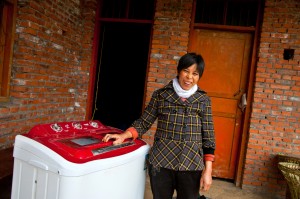While the American Red Cross has been busy responding to tornadoes, flooding and wildfires across the United States, our disaster management experts have also been working around the world to help other communities respond to and recover from major disasters.
Just this week, the Red Cross announced an additional $91,000 contribution to assist the Bolivian Red Cross in the face of heavy rains, floods and mudslides. This funding will help vulnerable people receive transitional homes; expand the provision of clean water and sanitation; and support other recovery activities.
Here’s a roundup of our long-term recovery work:
2008 China Sichuan Earthquake
He Yi Hu currently must carry a bucket to the top of a hill every three days to fill it up with stagnant water. She will soon be connected to water thanks to the Red Cross – and can use her washing machine for the first time.
Today marks the three-year anniversary of the 8.0 earthquake in Sichuan, China that affected 15 million people and left 5 million people homeless. The American Red Cross has been engaged in a long-term effort to complement the work of the government as well as other Red Cross societies, focusing on connecting homes to clean water and improved sanitation as a means to improve health as well as quality of life. Learn more through this excellent video.
Also, our country director Ramsey Rayyis was also profiled recently for his extraordinary commitment to helping others.
2010 Haiti Earthquake
The money Americans donated to the Red Cross has provided life-saving relief to hundreds of thousands of Haitians and is now helping them rebuild their lives for the future. The American Red Cross has received approximately $483 million for Haiti, and has spent and signed contracts to spend nearly $314.5 million (as of May 6).
Currently, the Red Cross is moving to long-term recovery efforts such as shelter. We are building transitional homes now, and in the years ahead, we plan to spend much of the remaining money on permanent homes. We are also budgeting $100 million for repair and/or construction of permanent homes and affiliated services in the settlements where they are built and repaired, to ensure safe structures in a safe environment.
Even as the Red Cross works on long-term plans to help Haitians, we are prepared to respond to new and unexpected developments, such as the cholera outbreak. The American Red Cross has spent and signed agreements to spend $16.1 million on the cholera response. This money is used to purchase medical supplies and relief items; expand the American Red Cross team of promoters trained in cholera prevention and hygiene promotion to more than 500 Haitians; establish 250 distribution points for provision of oral rehydration salts; and train 1500 volunteers to manage these posts.
2011 Japanese Earthquake & Tsunami
In the past 60 days, employees and volunteers with the Japanese Red Cross have worked the equivalent of 46,000 days (or nearly 370,000 hours) collectively to provide medical care, relief items, shelter and emotional support to the survivors of the March 11 earthquake and tsunami. During the same time, the US has shown its solidarity for the survivors in extraordinary ways, helping the American Red Cross become one of the largest, international contributors to the response.
With the support of thousands of individuals and businesses, we have contributed more than $130 million to date to help heal people’s physical and emotional wounds. Initially, donations from the American people have been used to provide medical care for thousands of people, distribute relief items like blankets, improve conditions at the evacuation centers and find missing people for concerned loved ones. Donations have also helped to:
- deploy four disaster-management advisors to assist the Japanese Red Cross;
- provide support for 7,800 military family members who voluntarily left US installations in Japan following the disasters;
- and equip government-built temporary shelters with six new appliances each.
One of the biggest priorities for us now is to help with the rebuilding of the routine health services. Many hospitals, clinics, nursing homes and surgical centers were lost to the tsunami, and health care systems have been left in crisis as a consequence. In the coming months, the American Red Cross will help the Japanese Red Cross fund the building of a temporary hospital (with an emergency center and social welfare programs for the elderly) as well as a permanent nursing school in the Ishinomaki area. And as pledges are fulfilled, we will continue to look for ways to invest in the recovery of Japan’s northern coastal communities and report back on the impact donations from the US have made.

